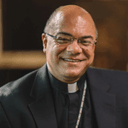Resolution Opposing the Death Penalty: Adopted unanimously by the General Assembly of the Texas Conference of Churches
February 24, 1998
WHEREAS the Texas Conference of Churches, in 1973 and 1977, and many of the churches and judicatories belonging to the Texas Conference of Churches have made clear statements in opposition to and calling for the abolition of the death penalty; and
WHEREAS the Bible does authorize every government to “bear the sword” (Rom. 13:4) and the governments and nations of this world are also called upon to care for “the least of these brothers and sisters” of Christ (Matt. 25:40) thus imposing upon each government and nation the obligation to respond to human situations and crises with justice and mercy; and
WHEREAS Jesus clearly rejected any ideas of “an eye for an eye and a tooth for a tooth,” (Matt 5:28 – 39), and the God of Israel insisted that “Vengeance is mine, I will repay,” (Deut. 32:35; and
WHEREAS in our modern society we have means of keeping an offender from harming others. Although in previous times people of faith have employed capital punishment, today we have the ability to realize better the principles of mercy, forgiveness and unconditional love for all people as evoked in the Hebrew Scriptures by the Prophet Ezekiel: “As I live, says the Lord God, I have no pleasure in the death of the wicked, but that the wicked turn from their ways and live; turn back from your evil ways.” (Ez. 33:11)* and
WHEREAS the evidence is overwhelming that racism, classism and economics are governing factors in administering the death penalty; and that greater numbers of people of color are executed than is reflected in the general population; that mentally incapacitated people and far too many poor and uneducated people have been executed — thus demonstrating the injustice of the current practice of exercising the death penalty; and
WHEREAS we believe that the compassionate example of Christ calls us to respect the God-given image found even in hardened criminals, and we stand in solidarity with the profound pain of the victims of brutal crime,* therefore be it
RESOLVED that the Texas Conference of Churches in Assembly in San Antonio, February 24, 1998, calls on the State of Texas to put an end to the practice of exercising the death penalty and reaffirms its previous resolutions in 1973 and 1977 in opposition to the death penalty; and be it further
RESOLVED that all judicatories, churches, members and caring citizens acknowledge our complicity in the continuing use of and support of the death penalty. When we are silent in the face of injustice, cruelty or oppression, our silence becomes our assent; and be it further
RESOLVED that we call upon all judicatories, churches, members and caring citizens to work in every way possible to oppose the death penalty and to work to create a humane, just and decent society; and be it further
RESOLVED that copies of this resolution be given publicity within the churches of the Texas Conference of Churches, sent to the Governor of Texas, the Lieutenant-Governor, the Attorney General, to the members of the Texas Legislature, to candidates for these offices and to the Chair of the Texas Board of Pardons and Paroles.
*These paragraphs are quotations from the Statement of the Catholic Bishops on Capital Punishment, October, 1997.



